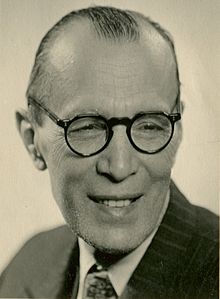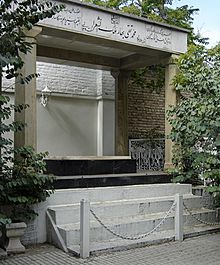Mohammad-Taqi Bahar facts for kids
Quick facts for kids
Mohammad-Taqi Bahar
محمدتقی بهار |
|
|---|---|
 |
|
| Born | 10 December 1886 Mashhad, Iran |
| Died | 22 April 1951 (aged 64) Tehran, Iran |
| Occupation | Poet, politician and journalist |
| Literary movement | Persian literature |
| Notable works | Tārikh-e Sistān Tārikh-e Mokh'tasar-e Ahzāb-e Siāssi |
| Spouse |
Sodabeh Safdari
(m. 1919) |
| Children | 6, including Mehrdad |
| Parents | Mohammad Kazem Sabouri |
Mohammad-Taqi Bahar (Persian: محمدتقی بهار) was a very famous Iranian poet, writer, and politician. He was born on December 10, 1886, in Mashhad, Iran. People often called him Malek osh-Sho'arā (Persian: ملکالشعراء), which means "the king of poets."
Bahar was not just a poet. He was also a scholar, a journalist, and a history expert. He taught literature at a university. Even though he lived in the 1900s, his poems were quite traditional. They often showed strong love for his country, Iran. Mohammad-Taqi Bahar was the father of Mehrdad Bahar, who was also a well-known Iranian scholar.
Contents
Mohammad-Taqi Bahar's Life Story
Mohammad-Taqi Bahar was born in Mashhad, a big city in the northeast of Iran. His father, Mohammad Kazem Sabouri, was also a famous poet. He held the special title of "King of Poets" for the shrine in Mashhad. Bahar's mother was a very religious woman. His family on his mother's side had Georgian roots.
Early Education and Talents
Bahar started learning when he was just three years old. His father was his first teacher. He also went to a traditional school called Maktab Khāneh. To learn even more, he studied with Adib Nai'shābouri. This teacher liked the old style of Persian poetry.
It is said that Bahar knew a lot of the Quran by heart when he was very young. When he was seven, he read the famous epic poem Shahnameh. He understood its deep meanings right away.
Bahar wrote his first poem at age eight. He chose "Bahār," meaning "Spring," as his pen name. He picked this name to honor a poet friend of his father's, Bahār Shirvāni, who had passed away.
Becoming a Poet Laureate
By the time he was 14, Bahar could speak Arabic very well. Later, he also learned to speak and write French fluently. When he was 18, his father died. Bahar then started working as a Muslim preacher.
During this time, he wrote a long poem called an Qasideh. He sent it to Mozzafar-al-Din Shah, who was the king. The king was so impressed that he made Bahar his Poet Laureate. This special title was given to him when he was only 19 years old, in 1903.
Joining the Revolution
When the Constitutional Revolution of Iran began (1906–1911), Bahar gave up his title as Poet Laureate. He joined the movement that wanted to create a parliament in Iran. A parliament is a group of elected people who make laws.
Bahar became an active member of a group in Mashhad that supported the parliament. He started several newspapers like Khorāsān and Nou-bahār. In these papers, he wrote many articles. He urged people to support the new parliament and create new public institutions.
After the revolution succeeded, Bahar was elected to the Parliament many times.
A New Path and Literary Work
In 1918, during the rule of Ahmad Shah Qajar, Bahar changed his focus. He stopped his religious work. He became a new kind of public figure. He also helped start "The Literary Association of the Academy."
This group published a monthly magazine called Majaleh-ye Dāneshkadeh. It had poems, stories, and articles. Bahar used this magazine to share his literary research. He also introduced Iranian readers to Western Literature. This magazine was very important for developing modern Persian literature.
After Tehran University was founded in 1934, Bahar became a Professor of Persian Literature. He spent most of his time writing and editing books. Some of his important works include:
- Tārikh-e Sistān (History of Sistan)
- Tārikh-e Mokh'tasar-e Ahzāb-e Siāssi (A Short History of Political Parties)
- Sabk Shenāsi (Methodology), which is about different styles of Persian writing
- Moj'malal ol-Tavārikh o val Qesās (Concise Histories and Tales)
- Javāme' ol-Hekāyāt (Collection of Stories)
- Two books of his own poems.
In 1945, Bahar briefly served as the Minister of Culture and Education. This was during the time of Mohammad Reza Pahlavi.
Later Life and Passing
In his final years, Bahar became ill with Tuberculosis. He went to Switzerland for medical treatment from 1947 to 1949. After he returned to Iran, his health quickly got worse.
Mohammad-Taqi Bahar passed away on April 21, 1951, at his home in Tehran. He is buried in the Zahir o-dowleh Cemetery in northern Tehran.
Bahar's Poems and Their Impact
Even though Bahar lived in the 20th century, his poems were very traditional. They also showed a strong love for his country. Many experts say that his writing style and beautiful poetry made him one of Iran's greatest cultural heroes. He was always against extreme ideas.
Through his magazine, Majaleh-ye Dāneshkadeh, Bahar greatly influenced modern Persian poetry and literature. Many early modern poets found ideas from Western literature. But Bahar's efforts helped these new ideas fit with Iranian culture.
In Bahar's collection of poems, you can find almost every type of Persian poetry. He wrote:
- Panegyric (poems of praise)
- Epic (long poems about heroes)
- Patriotic (poems about his homeland)
- Mystic (poems about spiritual ideas)
- Romantic (love poems)
- Ethical (poems about right and wrong)
- Didactic (poems that teach a lesson)
- Colloquial (poems using everyday language)
- Satirical (poems that make fun of things).
The Chained White Beast
"The Chained White Beast" is a famous poem by Bahar. In this poem, he praises Mount Damavand, which is the highest mountain in Iran. He uses the mountain as a symbol of love for one's country.
He wrote this poem in 1922. This was during the rule of Reza Shah, who was a powerful king. Reza Shah was trying to limit the power of other groups, like the parliament. This gave nationalists a chance to speak out.
In the poem, Bahar describes Damavand as a beast. He asks it to rise up and fight against injustice. He wants to see the true Iran flourish. This poem shows how the idea of nationalism was growing in Iran at that time.
See also
 In Spanish: Mohammad Taqí Bahar para niños
In Spanish: Mohammad Taqí Bahar para niños
- Mehrdad Bahar, Mohammad-Taqi Bahār's son.
- Five-Masters
- Sayyed Hasan Taqizadeh
- Abdolhossein Teymourtash
 | Calvin Brent |
 | Walter T. Bailey |
 | Martha Cassell Thompson |
 | Alberta Jeannette Cassell |


